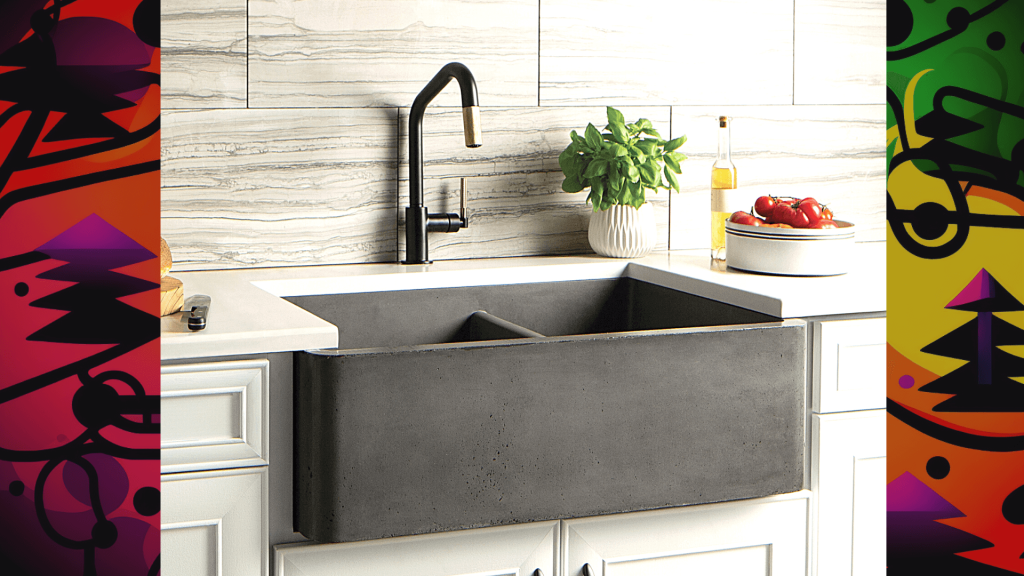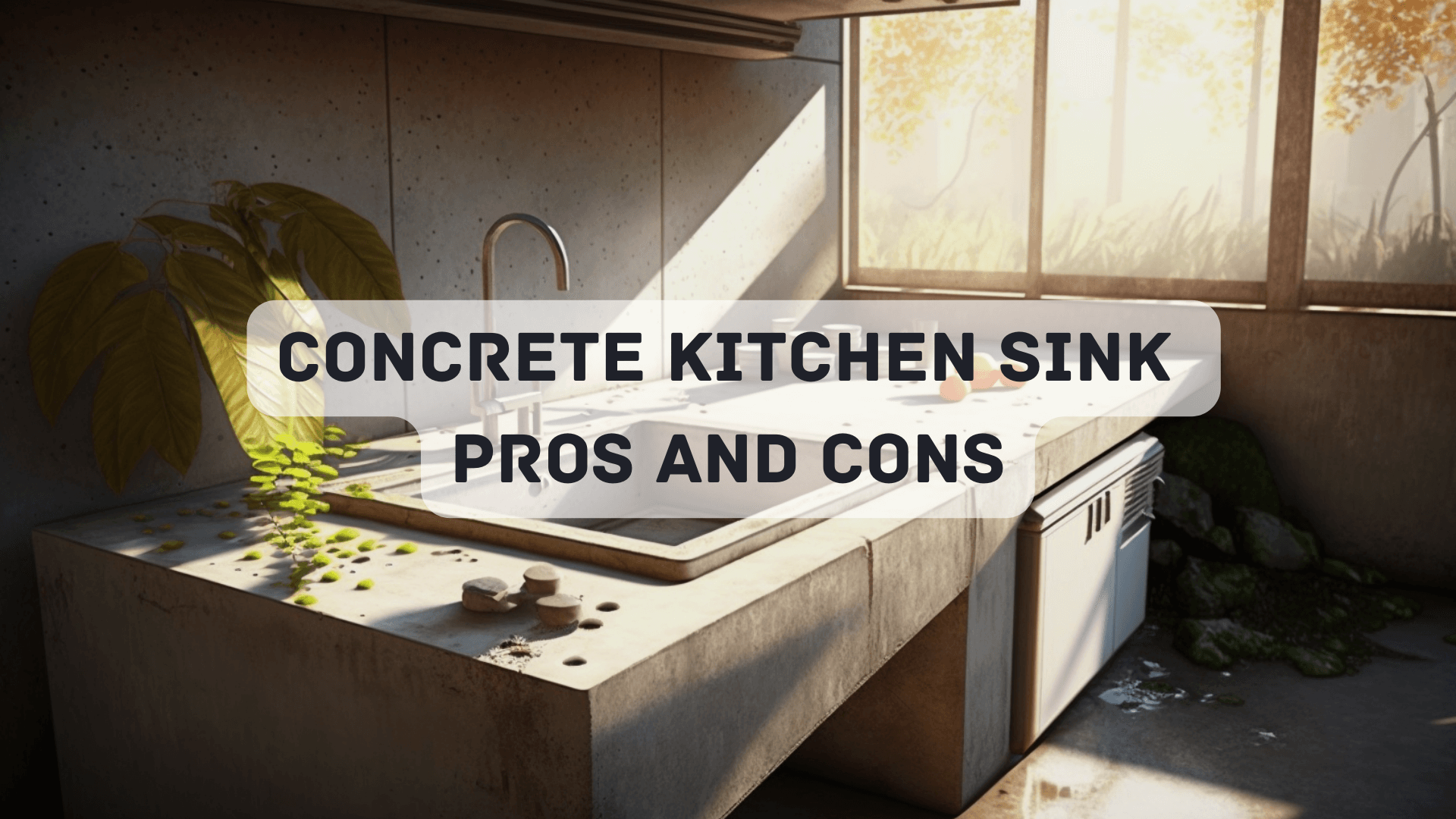Are you fed up with unexciting stainless-steel sinks and on the lookout for an exceptional and contemporary alternative? Look no further than the concrete sink. In recent times, concrete sinks have been gaining momentum due to their sophisticated and industrial appearance. But before you consider investing in one, let’s evaluate the benefits and drawbacks of having a Concrete Kitchen Sink.
Pros of a Concrete Sink
- Unique and modern look: If you’re going for an industrial or minimalist vibe in your kitchen, a concrete sink will definitely make a statement.
- Customizable: Concrete sinks can be made to order, so you can choose the size, shape, and color that best suits your needs and aesthetic.
- Durable: Are concrete sinks durable? Well, it depends on a few factors. Concrete is a tough material that can withstand heavy use and abuse, making it ideal for a high-traffic kitchen.
- Heat-resistant: Worried about hot pots and pans damaging your sink? Concrete can handle the heat, so you don’t have to worry about damaging it with your cooking.
- Sound-absorbing: Unlike stainless steel or porcelain sinks, concrete sinks are excellent at dampening sound, so you won’t hear that annoying clanging noise when you’re washing dishes.

Cons of a Concrete Sink
- Heavy: Concrete sinks are extremely heavy, which means they may require additional structural support to install. This can add to the overall cost of the sink.
- Porous: Concrete is a porous material, which means it can absorb liquids and stains if not sealed properly.
- Chipping: Although concrete is durable, it can chip if hit with a heavy object. This can be especially problematic if you drop a glass or a heavy pot into the sink.
- Cracking: If the sink is not installed properly, it can crack over time. This is especially true if the sink is not supported properly or if it’s exposed to extreme temperature changes.
- Maintenance: Concrete sinks require regular maintenance to keep them looking their best. This includes sealing the sink to prevent staining and chipping, as well as cleaning it regularly with a non-abrasive cleaner.
How to Maintain a Concrete Sink
To keep your concrete sink looking its best, follow these maintenance tips:
- Seal the sink: Concrete sinks should be sealed with a food-grade sealer to prevent staining and chipping. This should be done once a year to ensure maximum protection.
- Clean regularly: Clean your sink regularly with a non-abrasive cleaner and a soft cloth. Avoid using harsh chemicals or abrasive scrubbers, as these can damage the surface of the sink.
- Avoid standing water: Standing water can cause discoloration and staining, so make sure to wipe up any spills or splashes as soon as possible.
- Avoid harsh chemicals: Avoid using harsh chemicals, such as bleach or ammonia, on your sink. These can damage the surface and strip away the sealer.
The Biggest Disadvantage of Concrete
One major drawback of concrete sinks is their high price point. Custom designs and larger sizes can especially drive up the cost, and installation expenses may also factor into the final price. Nonetheless, if you’re seeking a durable and long-lasting sink, a concrete option may be a worthwhile investment.
Popular Concrete Kitchen Sink Brands

If you’re in the market for a concrete kitchen sink, there are several brands that specialize in creating high-quality, durable sinks that will last for years to come. Here are some of the most popular concrete kitchen sink brands on the market:
- Native Trails: Native Trails is a well-known brand that offers a variety of handcrafted concrete sinks in a range of sizes and styles. Their sinks are made from a combination of cement and natural jute fiber, which makes them both durable and eco-friendly. Read this article, if you are looking for cement kitchen sinks.
- Concrete Farmhouse Sinks: Concrete Farmhouse Sinks specializes in creating custom concrete sinks in a variety of sizes and shapes. They use a proprietary blend of cement and aggregates to create sinks that are both beautiful and functional.
- Sonoma Cast Stone: Sonoma Cast Stone offers a wide range of concrete kitchen sinks, including apron-front, undermount, and vessel styles. Their sinks are made from a unique blend of high-performance concrete and are available in a variety of colors and finishes.
- Stone Soup Concrete: Stone Soup Concrete specializes in creating custom concrete sinks that are tailored to your specific needs and preferences. They offer a range of sink styles, including farmhouse, vessel, and undermount, and use only the highest-quality materials to ensure long-lasting durability.
- Trueform Concrete: Trueform Concrete offers a range of concrete sinks, including countertop, vessel, and farmhouse styles. Their sinks are made from a unique blend of glass fiber reinforced concrete, which makes them both strong and lightweight.
If you’re considering a concrete kitchen sink, it’s crucial to do your homework and select a brand that produces long-lasting and robust sinks. Look for a company with a history of creating high-quality concrete sinks that can withstand daily wear and tear. Additionally, make sure the brand offers a warranty or guarantee that assures the sink’s durability and longevity. By selecting a reliable brand, you can be confident that your investment in a concrete sink will be worth it in the long run.
Do Concrete Sinks Need to be Sealed?
Yes, concrete sinks need to be sealed to prevent staining and chipping. A food-grade sealer should be applied once a year to ensure maximum protection.
What are Concrete Sinks Sealed With?
Concrete sinks are typically sealed with a food-grade sealer that is specifically designed for use on concrete surfaces. These sealers are non-toxic and saf for use in a kitchen environment. Some popular sealers for concrete sinks include:
- Cheng Concrete Sealer: This sealer is designed specifically for use on concrete countertops and sinks. It provides a long-lasting, non-toxic barrier that resists stains and chipping.
- Ghostshield 8500: This sealer is a water-based, penetrating sealer that provides long-lasting protection against stains and abrasions.
- Stonetech BulletProof Sealer: This sealer is designed to protect natural stone surfaces, including concrete. It provides a long-lasting barrier against stains and etching.
When choosing a sealer for your concrete sink, make sure to choose one that is specifically designed for use on concrete surfaces. Always follow the manufacturer’s instructions when applying the sealer to ensure maximum protection.
Concrete Sink Can be a Unique and Modern Addition to any Kitchen
A concrete sink can be a unique and modern addition to any kitchen, but it’s important to weigh the pros and cons before making a decision. Concrete sinks are durable, heat-resistant, and customizable, but they can be expensive, heavy, and require regular maintenance. If you’re willing to invest in a high-quality sink that will last for years to come, a concrete sink may be worth the investment. Just make sure to properly maintain and seal the sink to prevent staining and chipping. Happy kitchen remodeling!

